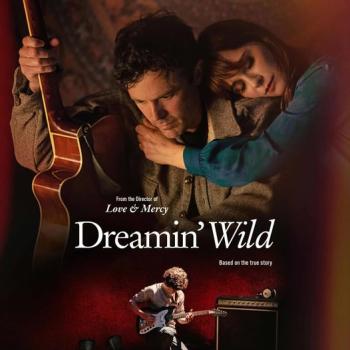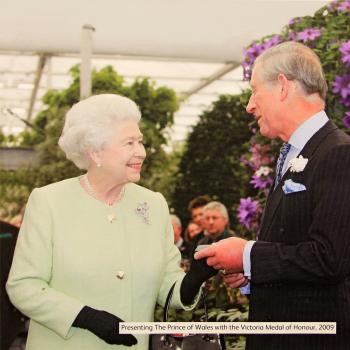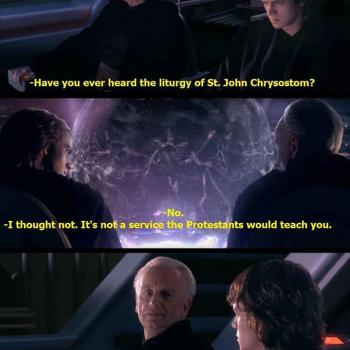I finally got to see the movie Bohemian Rhapsody this week, and I thoroughly enjoyed it, from even before the movie proper began, when the standard instrumentation on the 20th Century Fox fanfare was replaced with Queen style guitars playing the melody.
The film teases where it will end – Live Aid – before rewinding to London in 1970, with Farrokh Bulsara (who will later go by Freddie Bulsara and then Freddie Mercury) working at Heathrow Airport. His family is a conservative Zoroastrian one from India, and we later learn that Freddie was born in Zanzibar. Throughout the film, his family’s faith and in particular his father’s are prominent at key moments, with his father repeating a Zoroastrian motto – “Good thoughts, good words, good deeds” – multiple times, with Freddie at one point mocking his father’s teachings, and later Freddie uttering them himself, adding for emphasis “just like you taught me, dad.” At one of the many gatherings at the family home, Mr. Bulsara tells how the Parsis fled from Persia to India a thousand years earlier, and now have had to flee once more.
He goes to listen to a band, and stops by to talk to them afterwards to say he enjoyed the show, and that he does some songwriting too. They say he is minutes too late, as their lead singer just quit. He says that he sings, but they say his protruding teeth make him an unsuitable front man for a band. He proceeds to demonstrate the resonance and range that come from having been born with 4 extra incisors. They are suitably impressed.
At their first performance, Mercury struggled to raise a stuck microphone stand, leading him to rip the top part free and walk around with it in a manner that would become a signature part of his performance from then on. Musically, we find them to be every bit as experimental. They describe themselves to the representative of a record label as four misfits playing to outcasts, belonging to them. Later they will tell another record exec that formulas are a waste of time, and they plan with their next album to mix genres, cross boundaries, even speak in tongues if they have to. We see them putting objects on drums and in the piano, and physically swinging a speaker from a rope. They of course both capture attention, and meet resistance from those who claim that 6 minutes is too long for a track to be a viable single that will get radio play – never mind its puzzling lyrics about Scaramouch, Galileo, Figaro, and bismillah.
Mercury’s descent into a self-indulgent, sex and drug party filled, and incredibly lonely existence marks the tragic centerpiece of the film’s drama. At one point he says that being human is a condition that requires anesthesia. At another he talks about the darkness of the in-between moments. But we also see people for whom artistic creativity as vocation is central. The movie doesn’t fail to highlight that the members of the band are all highly educated (Dr. Brian May is famously an astrophysicist). But even beyond them, others in their entourage readily contradict the music exec who claims that “nobody likes opera.” Musical creativity requires passion and commitment, but also education and broad experience, in order to have a wide pool of sources to drawn inspiration from.
The moral message of the movie is a complex one, matching the complexity of Mercury’s life and Queen’s history. At one point one of the members of the band comments on how America is typified by public puritanism and private perversion. That comment sums up well what I think should be a central takeaway message. When we think about Mercury’s own tragic story of living in the closet as a gay man, eventually contracting AIDS leading to his untimely death at age 45. When we make it impossible for people to be themselves, maintaining a veneer of moralism that makes hypocrisy and deceit inevitable, we foster things that might not end up taking the form of “perversion” if they could be given healthier outlets. We cannot drive people to isolation behind masks that we impose on them, and secrecy about their own identity, and expect them to follow a course that is anything but self-destructive. That doesn’t excuse everything that Freddie Mercury and others have done when they found themselves in that kind of setting. But it does mean that the wider society shares something of the blame.
The final text at the end of the movie mentions that Mercury was cremated according to Zoroastrian custom, a fitting religious end to a life that wandered away from his roots, as many do in their teens and for a while thereafter, but eventually finding his way back to a rediscovery of the value of tradition, family, and true friends.
Elsewhere on Patheos there have been posts by Patrick Green and Ben Witherington, plus a podcast from Jeff Wright.
Have you seen Bohemian Rhapsody? If so, what did you think of it? If not, what are you waiting for?
I’ll have more to say in tomorrow’s blog post about a research project that I have begun working on and which I had in mind as I went to see the movie. Let me also mention that before the movie started, one of the trailers was for another rock music biopic that is apparently coming soon to theaters: Rocketman. I’m sure I don’t need to say who it will be about.













